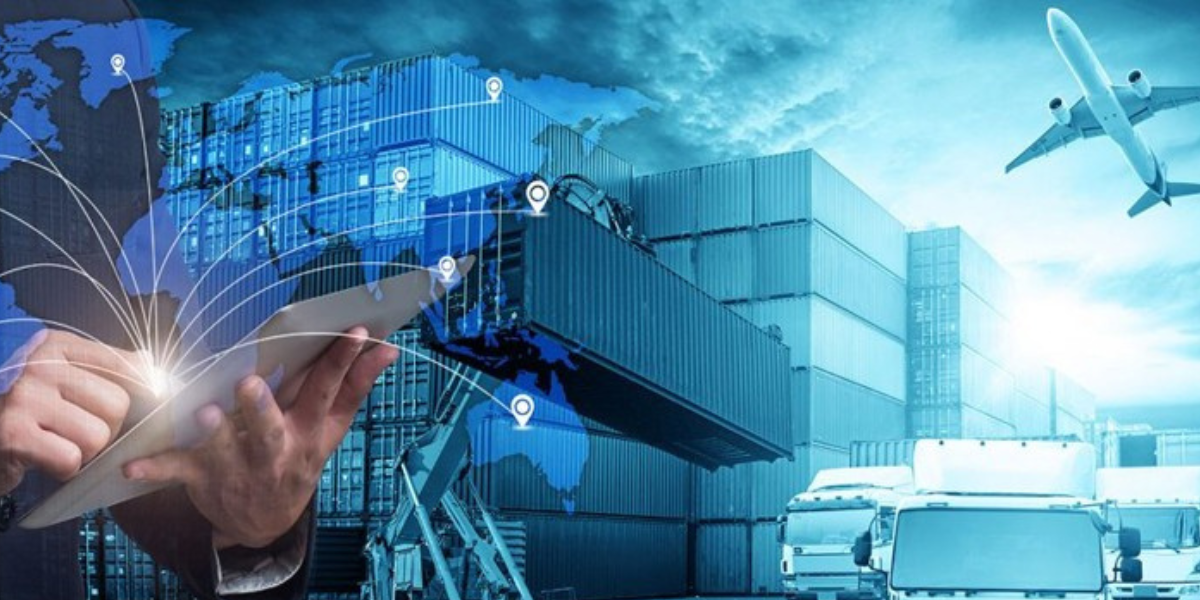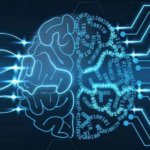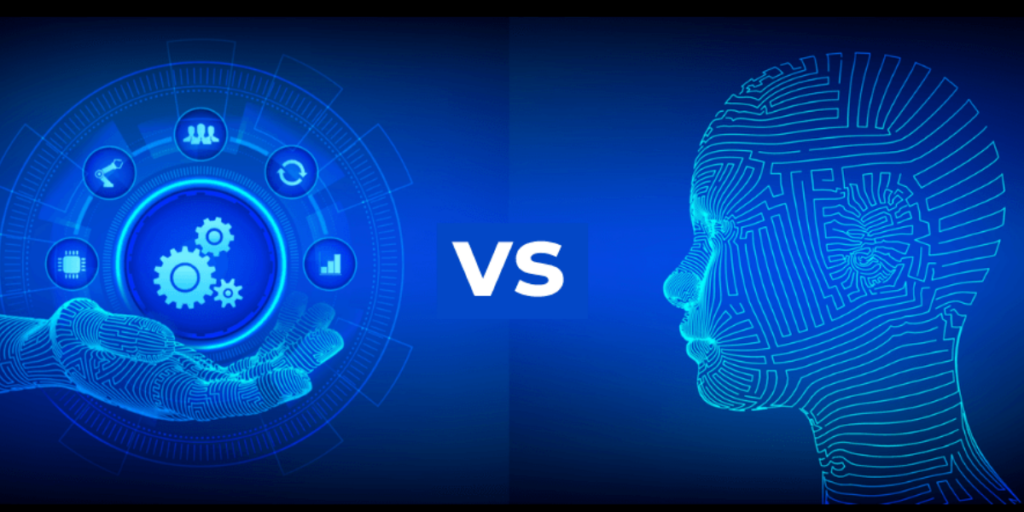The logistics industry, which previously depended heavily on labor-intensive and long-running processes, is now automated with artificial intelligence. Artificial intelligence in logistics is evolving into a streamlined machine where everything is planned. Traditional methods are replaced with logistics software development.
Numerous companies are investigating and implementing AI and ML in their business. Nearly half of logistics firms (58%) believe that AI will become widespread and take over many logistics tasks, including routing plans and empty-run avoidance.
Let’s explore how AI and machine learning alter the logistics software development solutions, including technologies used, use cases, benefits and challenges driving these shifts.
Understanding AI and Machine Learning in Logistics Software Development
Artificial Intelligence refers to the imitation of human intelligence by machines that can think and learn just as humans do. Machine Learning is an aspect of AI that focuses on the creation of algorithms that learn from and predict decisions using information.
In the field of logistics, AI and ML are being used to:
- Examine huge amounts of information to find patterns and trends.
- Be able to predict delays, demand, and interruptions accurately
- Automate decision-making processes
- Optimize routes and allocation of resources
- Enhance customer service with individualized experiences
Importance of AI and ML in Logistics Software Development
Supply chains constantly change, and traditional systems can’t keep up with the new and advanced demand for speed, precision, accuracy, and the ability to scale. AI and machine learning are disruptive technologies that can solve every issue with great efficiency.
Enhanced Efficiency
AI or ML decisions minimize human interference and thus increase the efficiency of logistics tasks. For instance, tasks like tracking and scheduling are tasks that these systems can complete in seconds, whereas they take hours to complete.
Improved Decision-Making
Logistics can be classified into various components, ranging from inventory control to moving schedules. AI and machine learning handle large quantities of data rapidly to find the most effective solutions.
Real-Time Adaptability
Logistics is extremely susceptible to sudden fluctuations, like intensifications of traffic jams, weather conditions, or geopolitical crises. AI-driven systems adjust these changes in real-time, including routing or scheduling resources and distribution, to prevent the accumulation of delays.
To understand the possibilities AI or machine learning can bring, it is necessary to be aware of what they are. Also, AI is the general idea of creating intelligent systems, whereas ML is about helping them grow autonomously based on experiences.
Role of Machine Learning and AI in Logistics Software Development
AI’s ability to speed up processes is revolutionizing software for logistics development. Here’s how.
Real-time Inventory Tracking and Management
Modern inventory management uses artificial intelligence to allow precise tracking and management, providing real-time insight into inventory levels.
The system can detect low stock levels, forecast demand fluctuations, and optimize replenishment strategies by using techniques like the Internet of Things and evaluating information from multiple sources, such as RFID, cameras, and barcodes. This reduces the number of stockouts and maximizes storage space.
Predictive Maintenance to Minimize Equipment Downtime
Monitoring machinery, a crucial resource warehouses can’t operate without, is among AI’s predictive abilities. AI can continuously examine data collected and generated by IoT devices and sensors to identify irregularities and anticipate imminent breakdowns. However, malfunctioning conveyors and forklifts can cause significant expenses and delays.
Using this information, businesses can plan preventative maintenance for periods when they won’t be substantially affected.
Warehouse Automation
74% of supply chain managers are increasing their investments in technology, and 90% say they’ll invest more than $1 million in the MHI Annual Industry Report. Many of these investments will go towards automation tools driven by AI, including warehouse robots.
The demand for warehouse robotics is increasing as companies invest in items that aid people in sorting, packing, moving, and storing parcels. Human workers could be replaced by robots. But they usually do monotonous work so that staff members can be freed to do more productive work.
Data-Driven Analytics
Logistics and warehousing always involve uncertainty and risk. Companies must be prepared for any scenario to ensure resilience to various threats. Risk management is becoming essential to dealing with global problems such as canals, pandemics, economic declines, and significant disruptions to supply chains.
AI risk management solutions help companies improve their action plans by analyzing various scenarios. Predictive analytics, for instance, could predict variables such as inventory, demand and supply, warehouse space capacity of truck drivers, and much more by analyzing historical data and implementing statistical models.
Dynamic pricing, where the prices of products fluctuate in accordance with demand and supply, is a different application of AI. In this way, AI can adapt more quickly to current market conditions, allowing companies to become more competitive.
Transportation Optimization
Transportation optimization is a particular logistics area in which AI is indeed shining. For example, by studying capacity data, weather reports, traffic information, real-time RFID tracking information, and other data, AI may be used to identify the most efficient shipping routes at any given time.
AI-powered route optimization allows logistics companies to speed up delivery times, which lowers costs and improves customer satisfaction. Furthermore, it reduces energy consumption and driving time needed to transport the same items.
Inventory Reconciliation and Analytics
Utilizing automated reconciliation, AI seamlessly integrates returned items into inventory records, subsequently updating stock levels and launching processes for restocking or disposal in the event of a need. With precise inventory records, AI provides businesses with an extensive overview of their inventory state, which allows an informed decision regarding future strategies for managing inventory. This ability improves the efficiency of operations, reduces the number of discrepancies, and enhances inventory control to ensure long-term success for businesses.
To inform future strategies for managing inventory and making decisions, AI examines inventory data to discover patterns, trends, and optimization opportunities. AI allows businesses to enhance inventory management processes and adapt to market changes through actionable information and recommendations.
Batch Tracking and Inventory Classification
With AI-powered monitoring tools, businesses can closely track and monitor inventory batches throughout the entire supply chain. This clear surveillance improves inventory management and assures an ideal inventory level and efficient resource allocation. Furthermore, by accurately recording the movements of inventory and store conditions, AI assists in simplifying compliance with regulations. AI helps quickly and efficiently respond to recalls or quality issues, reducing the impact on customers and effectively reducing risk to the company.
Tracking and Returns Management
With real-time tracking capabilities, AI tracks inventory movements during delivery, providing information on the status and location of shipments. AI helps reduce the chance of overstocking or stockouts. It also ensures precise delivery by constantly monitoring inventory levels throughout different supply chain stages. This proactive strategy ensures that inventory levels align with the demand at each stage within the supply chain, increasing operational efficiency and customer satisfaction.
Benefits of AI/ML in Logistics Software Development
In the dynamism of transportation and logistics, the introduction of technology such as Artificial Intelligence (AI) and Machine Learning (ML) brings an entire paradigm shift that will bring a variety of advantages that will change how we move items and control supply chains.
Enhanced Operational Efficiency
AI in transportation and logistics optimizes route planning, reducing travel time and improving smooth processes. Process streamlining with AI integration into the logistics industry can improve overall efficiency.
Cost Reduction Through Smart Resource Utilization
Utilizing AI’s potential in logistics and transportation can reduce expenses by optimizing resource utilization. Error reduction, an outcome of AI integration into the transportation sector, can also result in huge cost reductions.
Data-Driven Decision Making
AI integration into the logistics industry provides decision-makers with real-time information and allows them to make better decisions. Predictive analytics is an essential element of AI in transportation; it helps predict and prevent disruptions.
Customer Satisfaction and Reliable Deliveries
AI-driven systems improve customer satisfaction by offering precise delivery estimates and decreasing the risk. Real-time tracking, facilitated by AI integration into transportation, reduces delays and improves the security of the supply chain.
Adaptability and Future-Proofing
Transportation software development company provides AI/ML solutions for logistics that offer flexibility and scalability. With AI Development Services, logistics operations can adapt to the industry’s changing demands.
Integrating AI in transportation and logistics isn’t merely a technological improvement. It’s a strategic step towards innovation and resilience.
The leaders in the field are aware of AI’s transformational potential and are leveraging it not just to improve efficiency and cost-effectiveness but also to create an infrastructure for logistics that is flexible and flourishes in spite of ever-changing problems.
Be part of the future by embracing AI/ML. Logistics isn’t just about moving things; it’s about orchestrating a concerto of smart, data-driven choices.
Challenges of Implementing AI and Machine Learning in Logistics Software Development
Machine learning and AI in the supply chain could be important tools for analyzing large amounts of data, comprehending the relationships between processes, and helping make better decisions. However, there are a few challenges to implementing AI or ML in the development of logistics software.
Data Quality and Integration
Machine learning and AI within the supply chain require good and huge datasets to train the process to be successful. AI and ML models heavily depend upon the accuracy and quantity of data to train and make decisions. In supply chain management, data is often sourced from various sources, such as ERP systems, sensors, and third-party service providers. Ensuring accuracy, completeness, and consistency across these multiple sources is a huge problem. Poor data quality can result in inaccurate predictions, faulty choices, and insecure data, reducing the value of AI or ML.
Lack of Skilled Talent
Effective AI or ML application in supply chain management demands a multidisciplinary team with expertise in data science, supply chain operations, and domain-specific expertise. When implementing AI or machine learning within supply chain-related solutions, businesses face a number of issues related to recruiting and managing talent that hinder the application of AI and machine learning.
Complexity and Scale
The complexity and sheer size of supply chain networks present challenges for AI or machine learning models of supply chains due to many interconnected processes, constraints, stakeholders, and variables, as well as the necessity to adjust continually. Designing models that deal with these challenges and record their interactions while being accurate and objective is not an easy task.
Interpretability and Trust
AI and machine learning used in supply chain models, such as intense learning, are frequently considered “black boxes,” making it difficult to comprehend and understand their decision-making process. The lack of transparency could result in a lack of trust and skepticism within supply chain specialists, which can hinder the widespread acceptance of these technologies. Building confidence for AI or machine learning within supply chain systems must be based on the fact that they can be understood and provide transparent explanations of the generated data and recommendations.
Integration with Legacy Systems
Many supply chain companies have invested substantial time and resources in designing and deploying outdated systems and techniques. Therefore, integrating AI or ML software solutions within these systems poses a variety of obstacles, including the compatibility of data structure and formats and customizing. The synergy between these two systems is essential to maximizing AI and ML’s utility while changing the organization’s current processes.
Data Security and Privacy
When companies use AI, security and privacy are of concern within supply chains. Data from supply chains can be classified as confidential and include customer data, cost strategies and structures, and copies of patents and copyrights. AI and ML deployments could expose sensitive data or become vulnerable to cyber attacks, compromising data security and privacy. To avoid these threats, supply chain information must be protected by appropriate security measures, including encryption and data governance, in addition to proper access control.
AI and ML: Key Technologies Shaping Logistics Software Development
The integration of AI and machine learning in logistics applications is based on various core technologies that solve specific issues in the supply chain.
Natural Language Processing (NLP)
Because of NLP software, logic apps can detect and process natural language. Voice assistants and chatbots are a great example of how NLP improves communication between businesses and clients. They can be useful in managing customers’ inquiries, providing information regarding shipments, and handling complaints in a professional manner.
Computer Vision
Digital vision aids built into Artificial Intelligence are becoming more popular in quality monitoring and inventory management. Image recognition sensors and cameras can detect damaged items, track inventory, and enhance warehouse operations to the greatest extent.
Predictive Analytics
Analytical methods such as predictive modeling, one of the many aspects under the machine learning umbrella, can aid in making future projections or pinpointing future issues. They could determine when one of the fleet vehicles is likely to require repair or the extent to which an item will be required during the Christmas season.
Robotics Process Automation (RPA)
Automation is a key element of the operations of many logistics firms. The most commonly used functions are data input, order processing, and invoicing. Not only does it make things run more efficiently, but it can also free up human employees to do more productive work.
Together, various technologies used in logistics applications help tackle the complexity of modern supply chain processes.
Top Use Cases of AI/ML in Logistics Software Development
AI and ML integration into logistics revolutionizes business processes by automating mundane tasks and optimizing routes, enhancing security, and decreasing costs. Let’s take a look at a few great uses of AI/ML for logistics:
Market Demand Forecasting
Studies show that AI is predicted to increase logistics efficiency by more than 40% in 2035. One way technology can help manage supply chains is by forecasting demand. AI and ML can offer an outline of how to improve effectiveness by connecting a number of databases in the transport chain. This can help companies gain insight into how to move vehicles more efficiently and also avoid congestion in areas with common production delays.
Route Planning and Optimization
Traditional routes in logistics are typically static. They do not consider changing circumstances. This is why AI/ML development can be utilized to optimize routes and save businesses cash and time. AI-driven software for route planning can integrate a range of variables, like weather, traffic, and construction. As conditions alter, the program can continuously review routes.
Predictive Maintenance Analytics
It’s true that preventing sudden equipment breakdowns with standard maintenance schedules is often a problem for logistics. This can lead to delayed delivery, unhappy customers, and possibly high operational costs.
Yet, AI and ML algorithms can mitigate these risks by studying data collected from sensors installed on the equipment. With this information, it is possible to spot any anomalies that could be a sign of a possible failure.
Customer Service Chatbot
Customer support plays an important part in logistics; however, it’s mainly a manual process. In the age of technology, chatbots are an excellent way to manage many low-to-medium-level call center tasks. These can include requesting the delivery of a product, sending an order to track the shipment, and answering questions.
Self-Driving Trucks and Vehicles
Self-driving vehicles are more in demand than ever as logistics companies seek to cut costs and increase efficiency. Although they are still in the early stages, they are poised to transform the supply chain by making it more affordable and quicker.
Warehouse Process Automation
Since the majority of eCommerce businesses provide same-day delivery, warehouse automation is coming into play. Businesses are heavily relying on AI-powered warehouse automation tools like robotic pickers and Inventory management software. By 2026, over 60% of companies will be using AI-powered warehouse systems, which is a significant increase from 40% in 2020.
Real-Time Vehicle Monitoring
When combined with machine learning, AI or deep learning processes enormous amounts of data. This is an advantage to logistics firms looking for new ways to monitor their vehicles in real-time. AI-enabled tracking can create easier and more predictable supply chain management for the business and its clients.
AI and ML in Supply Chain: Future Trends
The upcoming AI developments in the supply chain include the shift to prescriptive and predictive analyses for proactive decision-making and thoughtful planning. This will lead to highly independent operations that require little human involvement. In this article, we will look at recent trends and the potential of AI for supply chains.
Predictive Analytics and Prescriptive Insights
Prescriptive analysis and predictive insight are extremely beneficial technologies in supply chain management (SCM). Although they’ve been around for years, they’ve only recently become accessible and widely used by small and medium-sized enterprises.
Companies improve supply chains with predictive analytics. With the increasing use of data, big data and predictive analytics are used to predict consumer behavior and enhance supply chains. Using historical data to support the supply chain, AI and machine learning improve the ability to forecast demand and optimize inventory. They also enable the use of predictive maintenance. However, this suggests that prescriptive analytics can recommend the best action strategy.
Autonomous Supply Chain Operations
The autonomous supply chain management process involves AI and machine-learning algorithms. However, the agents perform the entire operations with no human involvement. Thus, AI helps automate supply chains by improving the ability to forecast demand, control inventory, and manage warehousing and transport planning methods.
AI greatly enhances autonomous supply chain operations by improving demand forecasting, inventory management, warehouse automation, and transportation logistics. It enhances supply chain planning, supplier connections, risk management, and customer services. AI-driven systems provide real-time monitoring, decision-making, and sustainability, which results in more effective, durable, and flexible supply chains. Large companies like Amazon and Walmart use AI to gain these advantages and have demonstrated their transformational impact on future supply chains.
AI-Driven Supply Chain Networks
Machine learning and AI in supply chain-enhanced networks use advanced technologies like computer vision, machine learning, and natural language processing to improve and speed up the supply chain process. These networks help with forecasting demand and inventory control. They also aid in optimizing warehouse processes by using robotics and automation.
AI improves logistics and transportation because of its capacity to identify the most efficient routes based on the transportation fleets used throughout the entire network. Similar to that, the systems that integrate automation enhance the association between the supplier and customer and reduce risks while increasing the level of satisfaction with customers. In the end, AI and machine learning in supply chain networks enhance the flexibility and reliability of supply chains by increasing the capacity to meet customer needs and then react to shocks that may occur in the future.
AI Sustainability and Resilience
Artificial intelligence-based sustainable and robust supply chain management aims to use better resources and the capabilities to adjust to and recover from interruptions. Because of this, AI plays a crucial role in maximizing energy usage and reducing waste, as it can predict and manage resource usage. AI can also assist businesses in efficiently creating custom software solutions to environmental impacts, like purchasing materials, routing vehicles for transporting products, and recycling.
In terms of sustainable development, AI identifies future risks using vast databases and sources, such as weather and political climate shifts and market movements. This allows for efficient risk management, which includes taking measures to mitigate dangers before emergency situations.
Blockchain and AI Integration
Blockchain and AI within supply chains increase transparency, efficiency, and security. This is advantageous for tracking transactions, as Blockchain can be used to keep reliable records of transactions.
AI analyzes the data to assist in making choices, including managing inventory, forecasting demand, and identifying any imperfections. Utilizing natural machine learning, AI analyzes this data to provide suggestions for the best levels of inventory, forecast demand for a product, and detect any irregularities.
In the end, they help manage compliance, improve security, and increase resource efficiency because the software keeps track of the various sustainable actions.
Edge Computing for Real-time Decision Making
AI-assisted edge computing enhances real-time decision-making within the supply chain by analyzing the data from the collection site and reacting instantly. This combination of computation and integration makes it possible to analyze IoT sensor data at real-time centers, which could aid in inventory management, maintenance scheduling, and delivery management.
The process of making decisions is crucial since supply chains become more efficient by utilizing AI algorithms at the edges instead of relying on information from central data centers. It is crucial for efficient operations, increasing flexibility, and ensuring the integrity of supply chain operations in flux.
Human-Machine Collaboration
Supply chain integration that incorporates artificial and human intelligence is designed to gain benefits in both inputs from humans and artificial intelligence to improve decision-making and operations.
AI and automation tackle routine tasks such as data processing, routine actions, and forecasting, allowing people to focus on methods, evaluations, and imagination. This improves the efficiency of operations in a wide range of areas, such as inventory management, forecasting demand, logistical operations, and demand forecasting.
This combination improves inventory and demand management and the efficiency of the supply chain. AI aids supply chain professionals in making better choices and swift action, increasing decision-making and thus improving supply chain resilience.
Conclusion
AI and Machine Learning are not just buzzwords. They are revolutionizing the logistics industry by enhancing the process of developing software and improving the efficiency of operations. From predictive analytics to routing optimization to automation and improving customer experience, their impact on AI and ML is vast and broad.
As the logistics industry continues to grow, businesses that adopt these technologies will not just improve their operational efficiency but also make themselves more competitive in the long run. The future of logistics software development is bright, fueled by the enlightening abilities provided by AI and ML, and companies that adapt to the changing landscape will prosper in a competitive market.








